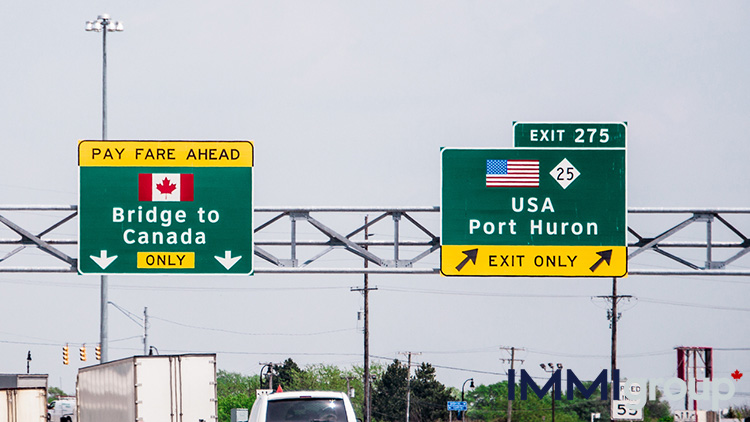Know your rights at the Canada / US border

If you’ve started to assume that you have few rights when crossing an international border in this age of heightened security, it might not just be paranoia. Every sovereign country reserves the right to deny entry to non-residents for any reason.
RIGHTS AT THE BORDER, RIGHTS WHEN DETAINED
If you’ve started to assume that you have few rights when crossing an international border in this age of heightened security, it might not just be paranoia. Every sovereign country reserves the right to deny entry to non-residents (who are not citizens) for any reason. Apart from the UN Universal Charter of Human Rights and Freedoms’ (which is, let’s face it, unenforceable) call to provide refuge to those persecuted in their home countries, there are virtually no internationally agreed-upon regulations governing border crossings. In general, each country has wide latitude in questioning and searching would-be visitors and immigrants. Most Western countries limit the invasive power of law enforcement and border agencies when it comes to re-admitting citizens and lawful residents, but there are virtually no limits when it comes to non-residents. As a non-resident all of the burden of proof of admissibility is on you, and it is absolutely your responsibility to fulfil whatever Visa requirements international trade and goodwill (or hostility) has dictated.
Note: This article is about entering Canada and the US as a permanent resident, visitor, student or temporary worker. Citizens are allowed to enter regardless of residency, though citizens are still subject to customs duties and import restrictions.
Here are a few specific cases:
YOUR RIGHTS WHEN ENTERING CANADA AS A…
RESIDENT
As a lawful resident you cannot be subject to warrantless search on re-entry “without reason,” but the latitude granted to border agents in this regard is fairly wide. Almost any “reason” is acceptable, including the slightest amount of curiosity about the CBSA agent’s questioning techniques. The only real right you have in this instance is the right that you must be alerted to your right to legal counsel, and you have the right to have the search request reviewed by a superior before complying with it. You cannot breach Canada’s laws, of course, you must comply with import duties (duties are law after all), and you have no right not to discuss the goods you are bringing in to the country with border agents.
NON-RESIDENT
As a non-resident you can be subject to warrantless search and you can be detained for up to 48 hours on “reasonable” suspicion of failure to comply with border or visa regulations. You will attend a Detention Review Hearing within 48 hours (longer if you’re detained on a Friday). You can also be detained if a border or immigration official suspects that you are lying about your citizenship or residency status. Non-residents are entitled to a lawyer and an interpreter if they do not speak English or French, and they can remain silent after they’ve been arrested until they have consulted with a lawyer (if they choose to). But that’s about it.
There are a wide variety of reasons for which you can be detained after being arrested at a point of entry or anywhere in Canada. The “Immigration Rights Handbook” (pdf) prepared by Community Legal Education Ontario lists some of these reasons:
- You do not have identity documents that are satisfactory to Citizenship and Immigration Canada (CIC).
- The Canadian Border Services Agency (CBSA) thinks that you are lying about your reason for coming to Canada.
- CBSA thinks that if you enter Canada as a visitor, you will stay instead of leaving when you are supposed to.
- You were deported or excluded from Canada but you have come back without the written permission of an immigration officer.
- You entered Canada illegally or used false documents in the past.
- You have been working in Canada without a work permit.
- You stayed in Canada after your visitor’s status expired.
- You moved and did not give CIC or CBSA your new address.
- You did not show up for an interview, a hearing, or removal.
- You broke a condition that was part of a previous release order.
If you fall under any of these categories and try to enter Canada, chances are you will be detained or turned around.
YOUR RIGHTS WHEN ENTERING THE U.S. AS A …
RESIDENT
As a US lawful resident you have the right to remain silent when re-entering the US, as long as you provide adequate proof of citizenship or lawful residency and make a written customs declaration. Enhanced border security in the US means that brief detentions are probable if you choose to exercise the right to remain silent, according to reports from the travelling lawyer Paul Karl Lukacs, who was detained and eventually released after offering the bare minimum amount of legally required co-operation.
NON-RESIDENT
If you’re entering the US as a non-resident, your rights are very limited. The US is still detaining foreign nationals at an alarming rate (hundreds of thousands a year, down from over a million a year last decade), and reserves the right to detain terrorism suspects indefinitely. While the most infamous detainment facilities are in Guantanamo Bay, near the Mexican Border, and at so-called “Black Sites” across Europe and Asia, border agents along the northern border with Canada are proving to be just as overzealous. Just like entering Canada, as a non-resident you may be subject to warrantless search, you can be detained on “reasonable” suspicion of failure to comply with border or visa regulations, and you can be detained if the border or immigration official suspects that you are lying about your citizenship or residency status. It is important to remember how sensitive the US has become to the threat of illegal immigration and violent terrorism, and how frequently they confuse one for the other. A massive investment in border infrastructure and staff has created a guard class tripping heavily on their new powers and bringing border search and interrogation to new heights (or depths).
This article is intended as general information as not as legal advice.

![US Border By Makaristos [Public domain], from Wikimedia Commons](https://upload.wikimedia.org/wikipedia/commons/thumb/2/20/US-border-notice.jpg/640px-US-border-notice.jpg)